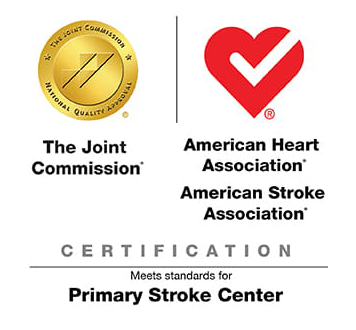Our Expertise
CMH’s exceptionally skilled team treats brain and spine disorders, including:
- Cervical spine disorders
- Chronic low back pain
- Herniated disk
- Hydrocephalus
- Lumbar spinal stenosis
- Stroke (brain attack)
- Trigeminal neuralgia
- Brain and spinal tumors
Other procedures include the repair of ruptured discs in the spinal column, bleeding problems within the brain tissue or the surrounding membranes, tumor excision, or pituitary gland surgery.
Awards and Accreditations
Central Maine Healthcare’s Neurology Department is honored to bring nationally recognized, top-rated care to our community. Our awards and certifications demonstrate that we meet the highest standards in patient services, bringing you the best care available in this region. Below, you’ll see a few of the reasons why Central Maine Healthcare has been named one of the leading Neurology providers in the country.
The Joint Commission’s Primary Stroke Center Certification
This prestigious certification recognizes Central Maine Healthcare’s Neurology Department as a leader in the nation for our high-quality stroke care. The Joint Commission is the oldest and largest accrediting body in the U.S., and they awarded this distinction after a rigorous inspection of Central Maine Healthcare’s quality and safety procedures and data.
One of the biggest achievements highlighted was our multidisciplinary approach to neurology care. That means that should you or a loved one ever need our care, they will receive it from a celebrated team of board-certified healthcare professionals from several different specialties. Our success with this personalized, team-oriented approach to care is why Central Maine Healthcare was also noted by The Joint Commission as one of the top patient outcome achievers. You and your family can expect fast, accurate care and the best possible chance for recovery and rehabilitation.
American Heart Association & American Stroke Association’s “Get with the Guidelines – GOLD PLUS Quality Achievement Award”
Both the AHA and ASA recognize Central Maine Healthcare’s commitment to providing the very best treatment for your stroke or other related condition. Our doctors, nurses and other team members always base our treatment plans on the latest science and guidelines to ensure that you are receiving safe, cutting-edge care.

Quality and Safety Outcomes
At Central Maine Healthcare, our goal is to provide you the finest neurological care possible. We believe the way to produce the best outcomes is by working with nationally recognized, highly trained professionals and keeping our focus on patient safety which is our highest priority.
We Make Our Safety Data Transparent
We share our data publicly to give you the opportunity to compare us to other health centers. A well-informed patient is a satisfied patient, and we want to help you make an informed decision about your healthcare providers.
Your Input is Important to Us
We’re always looking for ways to enhance your experience with us. If you have suggestions on how we can improve the quality of our care, please call and speak to one of our Patient Advocates at Central Maine Medical Center 207-795-2398, Bridgton Hospital 207-647-6099 or Rumford Hospital 207-369-1488. We’ll follow-up as soon as possible.
Thank you for choosing Central Maine Healthcare – and thank you for helping us improve our services.
